Blog
Refugee Mental Health: Our Responsibility
October 10th is World Mental Health Day. Refugees are less likely to seek treatment than non-refugees, but you can help lessen the stigma. Pictured above: a Problem Management Plus (PM+) training.
Generations of Stigma
Mental health is just as important as physical health. Habie Timbo, Community Outreach Case Manager and Mental Health Caseworker, explains what mental health is:
“Mental health includes our emotional, psychological, and social well-being. It affects how we think, feel, and act. It also helps determine how we handle stress, relate to others, and make choices.”
The stigma around mental health exists in every community. Timbo believes it exists because people connect their symptoms with weaknesses or negative character traits. People may not know that invisible concerns can have the same debilitating effects as a physical illness/concern.
Stigma is prevalent in refugee communities. The cultural norms and accessibility to resources in the migration process play a role in this.
Timbo explains this further: “Many communities have their own practices that their cultures have used for generations on to address their own mental health concerns. In the U.S, systems are structured in a way that may cause fear.”
Individuals fear exclusion or expulsion from their main supports and cultural identity. Regardless of nationality, many deny that a mental concern could impact them.
A Need for Resources
There are resources available, but they are limited. For example, there is no provider in the Quad Cities that specializes in working with immigrants and refugees. There are also the challenges of transportation, affordability, and trust.
WRQC is developing the Refugee Health and Wellness program for in-house services. Timbo’s goal is to offer services like interventions and helping clients connect with community resources.
Like WRQC, more refugee agencies are focusing on adding mental health into their expertise.
The U.S. has started to recognize the need for mental health services for immigrant and refugee individuals. Phone crisis lines have become equipped with providing interpretation services. All Medicaid providers are required to offer interpreter services.
But, more can still be done.
Mental Health is Health
While reducing stigma for mental health is not an easy feat, Timbo has some ideas: “[We can] normalize discussions about mental health concerns early in the resettlement process. Recognize the trauma and lack of safety. Create treatments and access points that include culturally competent and cross-cultural trauma informed practices.”
Change can start with the individual. People can help by checking up on their loved ones and noticing changes in their behavior. Timbo urges people to reach out about how they are feeling.
If you notice anything, there is nothing wrong with having an intervention or a check in. It is important to give support and resources.
Timbo wants to remind everyone, “We are all responsible for making mental health a part of our health discussion so that we can help decrease stigma and build relationships for a healthy community.”
For immigrants or refugees, adjusting to a new environment can take a toll on their wellbeing. They are already disconnected from their cultural identities, so seeking out mental health services is crucial for the long run.
It is important to have support and services available for these individuals so that they are able to create mental wellness routines and can prevent further trauma or illness.
Mental health care is health care. Take care of yourself and watch out for others.
Visit our volunteering page to find out more about becoming a friendship partner to provide support in those crucial first months.
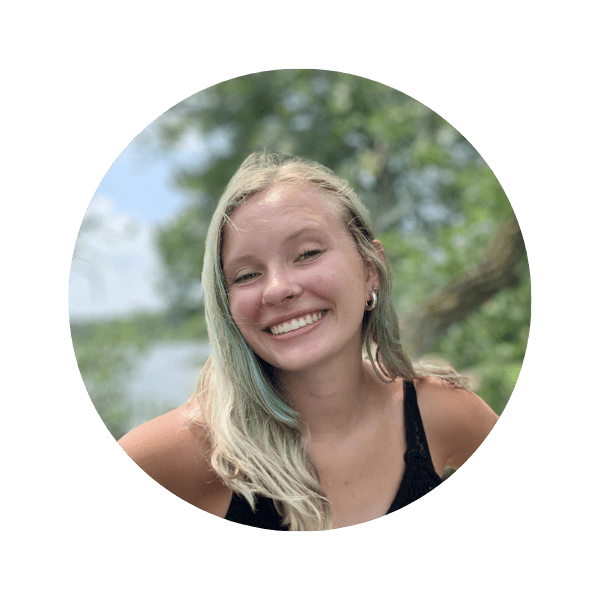
Sloane McIlrath interns with the APA and Communications team at World Relief. She is a senior at Augustana College majoring in Creative Writing and Multimedia Journalism Mass Communication. She wants to share people’s stories and bring more awareness through her writing.
More than a Job: How Liberty Packaging is Helping Refugees
Founded by Immigrants
Jack Fiterman, founder of Liberty Diversified International (LDI), was an immigrant. He wanted to include “Liberty” in the name because it’s a founding principle of this country. Founded in 1918, LDI has been a family-owned company for almost four generations. Supporting immigrants and refugees is in their foundation.
Part of LDI, Liberty Packaging is a corrugated box manufacturer with a facility located in Rock Island. Steve Walzer, their Human Resources Manager, connected with World Relief Quad Cities and gave refugees more than a job.
“Like many companies right now, we are faced with a challenge of keeping up with the demand for labor,” Walzer said. Especially in the Quad Cities.
Liberty Packaging was searching for sources of candidates that may not have always been apparent to them. They looked into multiple organizations around the Quad Cities that work with immigrants. Walzer said World Relief Quad Cities was a company they were excited to work with. He reached out to Grace Fitzpatrick, WRQC Employment Manager, to connect.
A Strong Community
Liberty Packaging brought in refugees from WRQC and showed them around the facility. They talked about the job opportunities with an interpreter.
“We wanted to make sure it was a good fit,” he said.
From there, Walzer makes sure they feel welcome and a part of the community. The company prides itself on creating a space where community is strong. The new employees are from Afghanistan, and the team has been trying their hardest to make a safe and welcoming space. The two areas that Liberty Packaging has focused on are communication and cultural aspects.
They wanted to find a solution to the language barrier. Walzer understands that each person comes in with a different level of understanding of English and that some of the employees are taking ESL classes. They have worked with World Relief Quad Cities interpreters and are now looking into telephone service that can be used for language interpretation.
Walzer also wanted to recognize their cultural needs. The new employees needed a space for religious practices. So, they built one on-site for them.
Part of the Family
“Some of us had some experience with [other cultures], so we understood that they needed a space,” Walzer said. They built a prayer room for the new employees away from the workspace, and employees have time for prayer during their breaks.
Another goal in welcoming the refugees to their work force was integrating them into Liberty’s community. They worked with their current employees to help set up support for their new coworkers, like training. Many of the employees were very embracing of the opportunity to work with refugees.
“We are still working through how we can continue to improve at all times. We are always looking to get better, but I think so far we have had really good success. The best evidence that I can offer is that all 7 that started with us are still with us,” Walzer said.
For other companies looking to work with organizations like World Relief Quad Cities, Walzer has some advice. At first, the language barrier can seem like a challenge. However, it’s important to put the time and effort into figuring out and working with each person, and to use resources.
“These individuals coming in from a different country, are motivated, and want to work. Some employers might say I don’t know how to make [success] happen, you can make it happen,” Walzer said.
Interested in hiring refugees? Visit our employment page or reach out to Grace at gfitzpatrick@wr.org for more information.

Sloane McIlrath interns with the APA and Communications team at World Relief. She is a senior at Augustana College majoring in Creative Writing and Multimedia Journalism Mass Communication. She wants to share people’s stories and bring more awareness through her writing.
A Look into Casework – Serenity Beesley
Read how casework impacted Serenity’s heart towards the most vulnerable.
A Look into Casework
Have you ever wondered what casework looks like at World Relief North Texas? What better way to learn than from one of our caseworkers!
Meet Serenity Beesley. Serenity currently serves in our Reception and Placement program at World Relief North Texas. Serenity is fun, spunky, and a light everywhere she goes.
Let’s Start at the Beginning
After moving to Texas, Serenity became involved with a local church and met a World Relief employee. At the time, Serenity was working with a workforce development program at Goodwill, seeking to bridge the gap between the unemployed and potential jobs by providing job training, job fairs, and work experience. As she continued to meet with clients, a passion developed within her to help those she worked with more holistically. In fact, this is what ultimately led her to World Relief: “God gifted World Relief to me. It was exactly the opportunity I was praying for.”
As a caseworker with World Relief North Texas, Serenity’s responsibilities are robust, and focused on helping her clients transition into the U.S. This begins during airport arrivals and includes things like: ensuring housing is ready, taking them grocery shopping, meeting with them the next day and setting expectations of what living in the U.S. looks like. In addition, she explains ALL the paperwork, and simply gets to know them.
What to Expect
For the next 90 days, Serenity cares for those who have been entrusted to her. She takes them to doctors’ appointments, teaches them how to manage money, enroll their kids in school, prepares them for schedules and daily life in the U.S. explains Medicaid, how to apply for a Social Security card, how to navigate the food stamp process, financial programs, and, ultimately, helps each client come to a place where they genuinely understand how we can help them. Serenity walks them through how to get phones, cash their checks and navigate public transportation. She connects them with Family Friends to assist in the ways she physically cannot, and connects them into the community through constant networking.
The End Goal
For Serenity, the end goal of casework has two-sides. As a Christian, she desires to bear the image of Christ and also selflessly serve the least of these that Jesus related himself too. Being a caseworker allows her to live out this passion, for it is a job with the end goal of seeing someone become self-sufficient and pursue flourishing for themselves and their family in the U.S. But, as Serenity shares, it doesn’t come without its sacrifices.
“If I want to care for them and have a relationship with them, I will have to sacrifice my time. I can’t have a black and white schedule for that because they are image bearers. People sometimes don’t fit into the schedule of an 8-hour day. They deserve time outside of 8-5.” It is important to remember that “people deserve relationships. This job has helped conform me to the image of Christ, but it’s hard because that is not our nature.”
Personal Transformation
When we asked Serenity how being a caseworker has challenged her faith, she shared that it has shown her how insignificant she is, and how big God is. She described how she is unable to give and provide every single need in herself alone, and how she has seen God provide for the needs of clients outside of her. She knows that God doesn’t need her but He chooses to use her for His good. Serenity confessed that her constant prayer is to be reminded that she is to be LIKE Christ, but not BE Christ. She prays, “Lord only you can help these people and take on all of their problems.”
Serenity also shared that casework has challenged her faith as God continually and kindly reminds her that He is the one in control and the provider for all. This job has been humbling and has confirmed to her that above all she is a servant.
She reminded us of Galatians 6:9, “Let us not become weary in doing good, for at the proper time we will reap a harvest if we do not give up.”
Learn how you can serve with World Relief North Texas HERE.
Learn how you can volunteer with World Relief North Texas HERE.
Peace like Breath
These days, peace feels hard to find. International conflicts, ongoing fall-out from COVID-19 and climate disasters can all disrupt our peace and well-being. Yet, at World Relief, we have the privilege of working alongside people who have overcome some of life’s great challenges, finding personal peace even in the midst of difficult circumstances.
That’s why, as a part of our inaugural World Relief Youth Writing Contest, we asked participants in World Relief Durham’s Mentorship Program to reflect on how each of us can be peacebuilders in our own lives and in the lives of those around us.
We are proud to announce Muhammad Hasham Ahmad as our 2022 contest winner! As the leaders of tomorrow, we believe refugee and immigrant youth have important things to say today — things we can all learn and grow from, no matter our age or where we’ve come from.
In his essay below, Muhammad shares how he believes we can all find peace, even in the midst of life’s challenges.
Peace has become a fancy word nowadays. Everyone likes peace but not everyone has it!
For me, peace means to be satisfied — to have a quiet and calm state of mind or simply to be in a situation where you are not worried about anything. From this definition, we can assume not everyone has peace.
Every year, there are millions of people who migrate because of problems they face that make them lose their peace. People leave their home country, some leaving their family and friends, to go to a new country in the hopes of finding peace.
Do you think they find their peace as soon as they land in a new country? No! They still have to face many problems in those new countries too — like my mom did.
She came to the U.S. without knowing any English. At first, she wasn’t able to communicate, but as time passed, she learned English well enough to be understood.
But still my mom worries as millions of thoughts cross her mind every day. Thoughts like: how am I going to provide for my children, myself, housing, insurance, finding work? How are my family back home doing? And many more worries…
Now, let’s talk about how children can lose their peace. Some come to the U.S. with little to no ability to write or speak English because they didn’t have the opportunity to go to school — like I didn’t.
Nowadays, all kinds of people lose peace in childhood because they are worried about living up to society’s standards. Standards like having good grades — fun fact: in an Asian household like mine, you better bring a report card home with all A’s! — a successful future, handling bullies at school, stress from moving, leaving old friends, getting along with new people and much more.
It is natural to lose peace while going through all of this. Everyone wants peace in their life, but not everyone knows how they can find it.
Peace may not be easy to find, but I remember something my teacher once said: “It is human nature to never be satisfied with what we have, so we worry about what we don’t have. If you keep worrying about something you can’t control, you will lose what you can control. So focus on your present rather than the future.”
This helps me find my peace.
We all should work on ourselves to become better, more peaceful people. Focus less on the expectations of others and worries about the future, and you will most likely find peace.
Lastly, I think peace should be as important as breathing. What happens if we don’t breathe? We die! In the same way, not having peace of mind slowly kills you every day and every moment. We lose our concentration and our ability to act and be in the present moment.
So work with the things you can control to save yourself from dying every day. That’s how we can all live a happy and peaceful life!
Pave the Path to lasting change. For young people like Muhammad, finding peace in a new home takes time. You can help create more opportunities for immigrant and refugee youth to heal, thrive and share their voices by joining World Relief Durham’s community of committed, monthly donors, The Path.
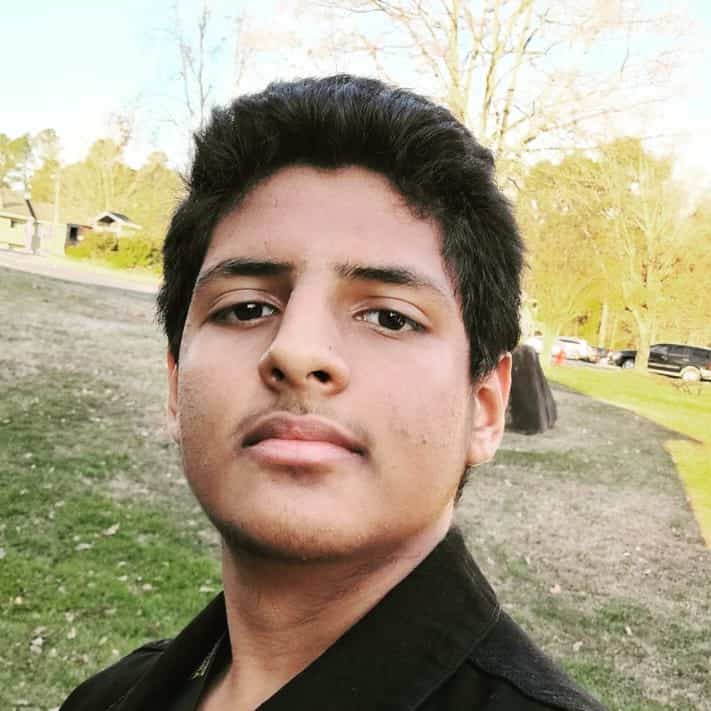
Muhammad Hasham Ahmad is 15 years old and lives in Durham, North Carolina. He came to the U.S. with his family four years ago after leaving his home country of Pakistan. He loves writing and making people laugh with his stories.
Who Is a Refugee? [and why should you care]
Not everyone who immigrates to the United States comes with the same status. While there is some overlap in terminology, following are some general definitions to keep in mind.
A migrant is someone who moves from place to place looking to improve their quality of life, through work or education. This is not to say that their movement is frivolous or unwarranted. They may be experiencing extreme poverty or other conditions in their home country that make life untenable. Many people leave family behind and move to a new location so that they can send money back home.
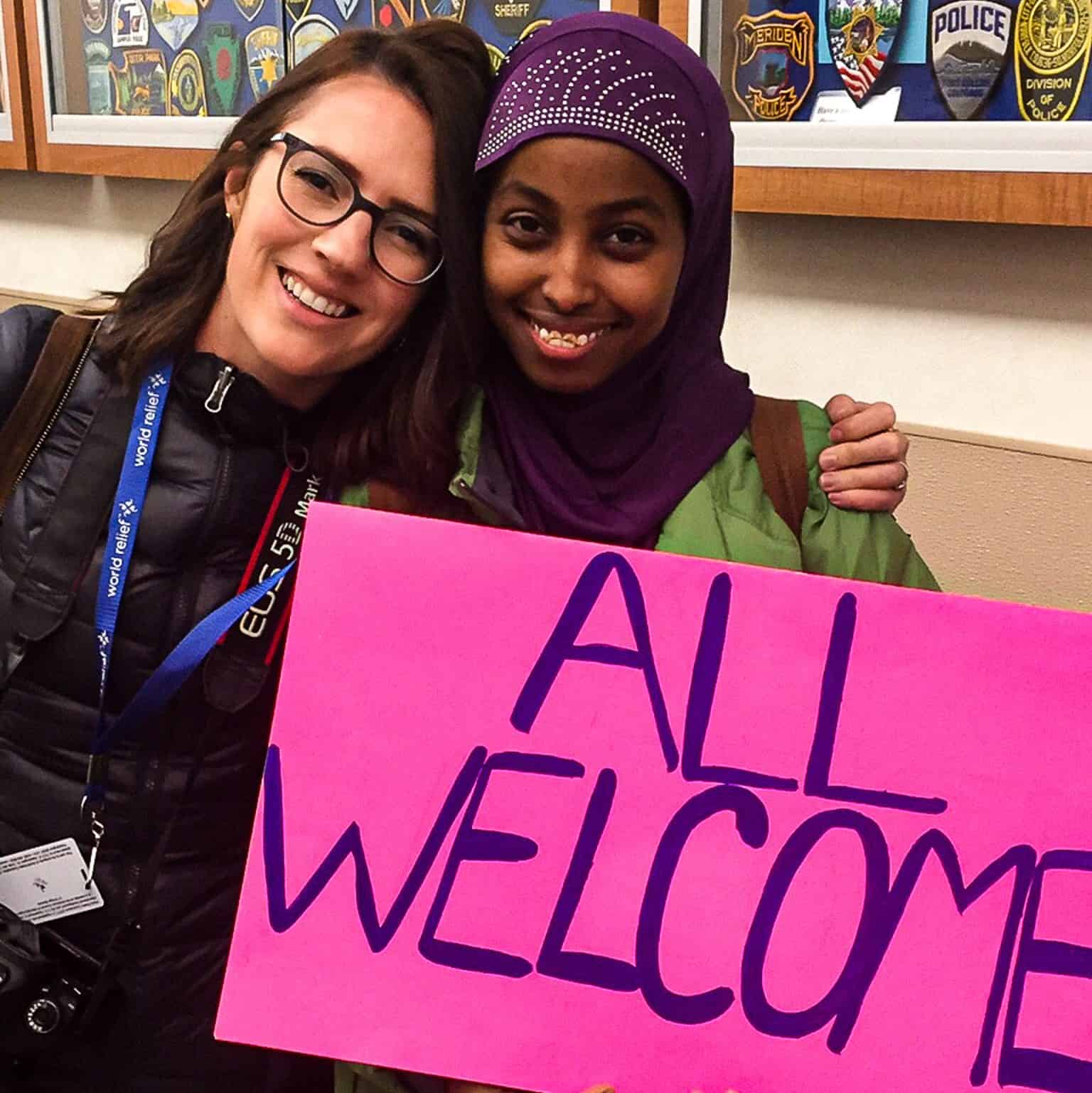
An immigrant implies someone who wants to live permanently in their destination country. Used in a general sense, the term does not mean that the person has been forced to leave their country of origin due to violence or persecution. Immigrants have to apply for visas and comply with immigration laws. The process can be expensive and take a long time, depending on a number of factors, including the country from which a person is emigrating. Immediate family of US citizens have top priority and the shortest wait.
The definition of Refugee from the UN Refugee Agency:
“Refugees are people who have fled war, violence, conflict or persecution and have crossed an international border to find safety in another country.
“They often have had to flee with little more than the clothes on their back, leaving behind homes, possessions, jobs and loved ones.
“The 1951 Refugee Convention is a key legal document and defines a refugee as: ‘someone who is unable or unwilling to return to their country of origin owing to a well-founded fear of being persecuted for reasons of race, religion, nationality, membership of a particular social group, or political opinion.’”
Refugees go through an incredibly rigorous vetting process before they are approved for entry into the United States.
World Relief Spokane serves clients with other immigration classifications, as well.
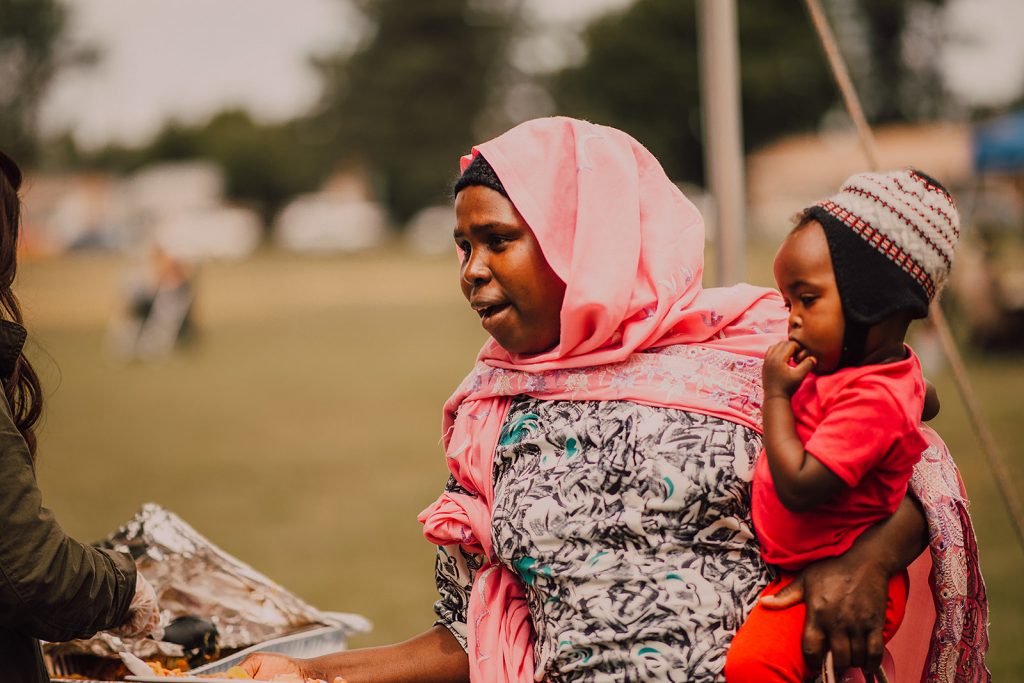
Humanitarian Parolee: The recent immigrants from Ukraine and Afghanistan are humanitarian parolees. Prior to the crises in Afghanistan and Ukraine, humanitarian parole was used quite sparingly by the US Citizenship and Immigration Services and was considered a temporary status.
“If you are granted humanitarian parole, you will be permitted to remain in the U.S. only for the period of time that is necessary for you to fulfill your humanitarian need or to tend to your emergency situation. You cannot obtain any permanent benefit with a grant of humanitarian parole, but you can apply for a temporary work authorization if you will need to work in the U.S. during your stay.” (nolo.com)
While Ukrainians and Afghans were granted legal entry into the United States relatively quickly, the pathway to permanent residence is not as clear as it is for someone with refugee status. The current process through which Ukrainians are granted permission to work has been frustratingly slow. World Relief Spokane currently has more than 100 Ukrainians in our Job Search program waiting for employment authorization.
Afghan parolees have been able to secure work authorization more quickly; however, their path to permanent residence is still in question. The Afghan Adjustment Act, currently before Congress, would address this issue and allow Afghans to apply for permanent residency.
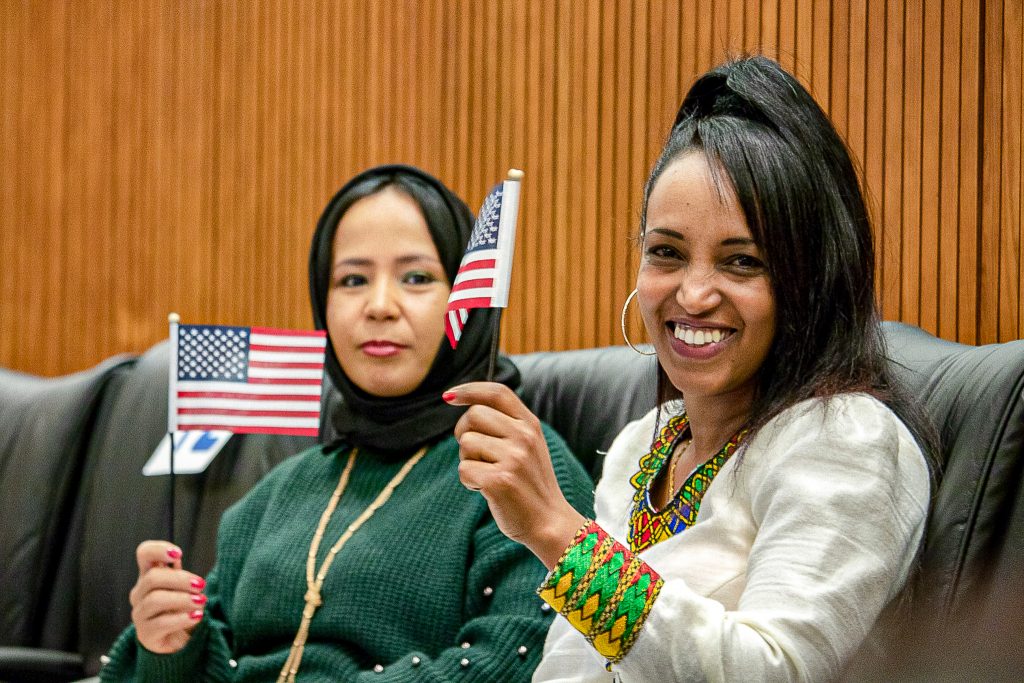
Asylee: According to the Department of Homeland Security, “An asylee is a person who meets the definition of refugee and is already present in the United States or is seeking admission at a port of entry.”
Additionally, many people are displaced within their own countries or are living as refugees in countries where they are not eligible for permanent residence. Many of these people are living in refugee camps.
“Approximately 22 percent of the world’s refugee population live in refugee camps – an estimated 6.6 million people. Among them, 4.5 million reside in planned and managed camps and approximately 2 million are sheltered in self-settled camps… Refugees may spend years and even decades living in camps, and it is common to have entire generations growing up in the camps.” UNHCR website
Why Should You Care?
What does all of this have to do with you and me?
We have the opportunity to create a welcoming space for people who are different from us. Last week I interviewed a woman who had to flee the Democratic Republic of Congo 30 years ago. She had spent two decades in various countries in Africa, seeking a safe place to raise her family before finally coming to the United States, to Spokane. She had one word to describe her new home: Peace. I asked her to elaborate, but she said she couldn’t. She seemed to be pleading with me to understand just how much was contained in that one word. Peace. She kept repeating it.
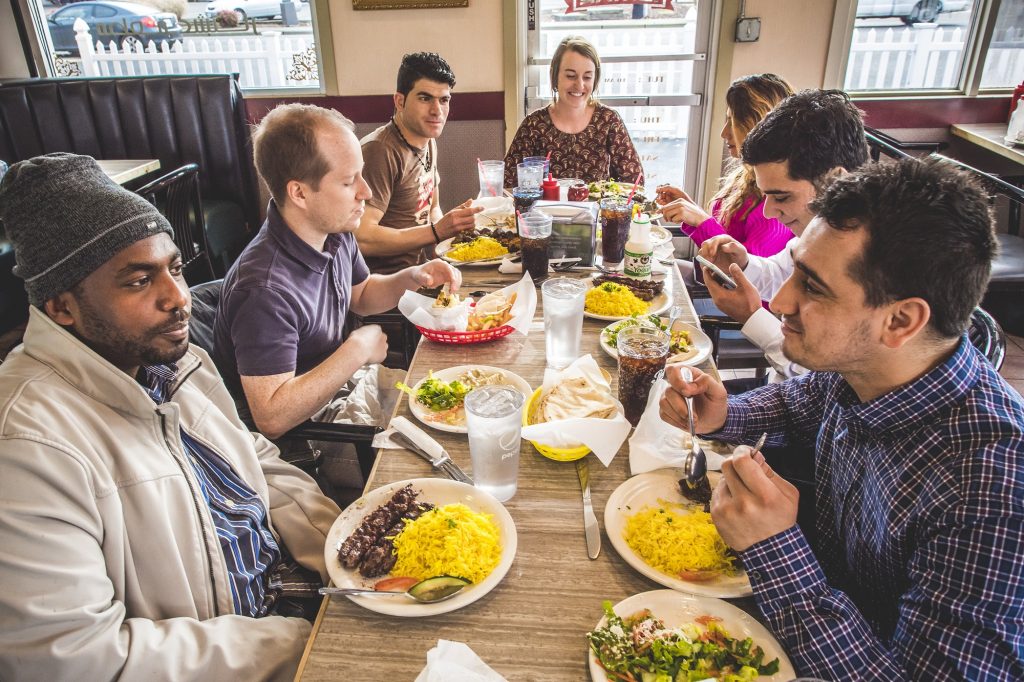
“Your life and my life flow into each other as wave flows into wave, and unless there is peace and joy and freedom for you, there can be no real peace or joy or freedom for me.”— Frederick Buechner
It’s tempting to want to close ourselves off from the outside world and focus on our own lives, our own families, our own bank accounts, comfort, future, but that is a small world, a limited world, and ultimately, it cannot fulfill us because we were made for connection. We were made to bear one another’s burdens, to learn from each other, to share with each other and to comfort with the comfort we ourselves have received.
If you’re interested in opening your life, your home, your world to immigrants and refugees, World Relief Spokane would love to walk alongside you in that.
Continue your learning experience by following us on social media or join us for “Around the Table 2022.”
How to Have Impact as a Volunteer Tutor
The volunteer tutors at World Relief have a superpower: they know how to bring out the unique gifts of each student to help them grow. Here’s how one tutor used a child’s passion to overcome his fears so he could flourish.
Aaron* is a 6-year-old boy who arrived with his family several years ago from an oppressive African country called Eritrea. For the past year, Aaron has been part of the Children & Youth program. He received tutoring support, participated in the summer program, and engaged in the spring student leadership team – a model set up to encourage active student participation in planning the summer program.
When Taylor*, Aaron’s volunteer tutor, first met him in 2021, she found it difficult to get him to say a word. In fact, no one could get him to talk. He was extremely shy. He kept his camera off during Zoom meetings. He took a long time to answer questions. He even struggled to share his own name.
But that was about to change when Taylor discovered this young boy’s passion. Aaron loved to draw.
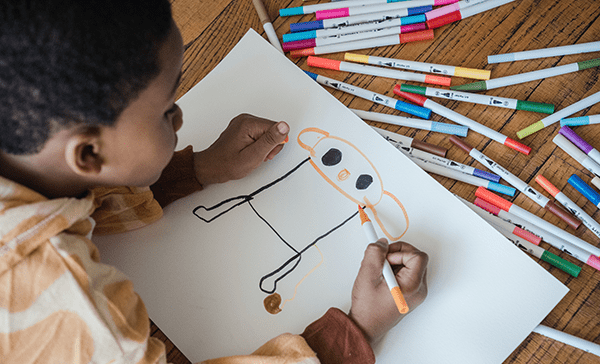
Turning Passion Into Learning
Taylor took Aaron’s love for drawing and turned it into an impactful teaching tool. Tutoring time became drawing time. As Aaron formed an object on his sheet of paper, Taylor taught him the English name for that object. She then followed up with how to spell it. With this learning process, Aaron grew stronger in his English skills.
Before long, he also grew in his confidence. Aaron began to turn his camera on for Zoom calls. He shared his opinion in group discussions with other students on the leadership team. And he grew excited about what the 2022 summer program would look like.
In fact, he didn’t miss a single day.
Turning Fear Into Friendship
Aaron was initially apprehensive about meeting new people when the summer program began. He didn’t want to leave the safety net of his cousins who were with him. But as time progressed, so did his willingness to make new friends.
Before long he was running around, playing with other boys his age, and chatting with new friends. Rides in the van to and from the program turned into times to play and share toys with the kids that rode alongside him – and to heroically rescue a new friend’s toy that fell beneath the seats.
As he grew to enjoy his interaction with the program leaders and volunteers, his friendship with them blossomed as well. After one intern had her last day at the summer program, Aaron asked his aunt to call her. He already missed her and wanted to talk with his new friend.
Your Impact as a Volunteer Tutor
Each year children just like Aaron grow in confidence and self-esteem because of the one-on-one connections they make with their volunteer tutors. Immigrant and refugee youth who otherwise may have stayed isolated and alone are supported in trying new activities, expanding their language skill, and forming new relationships. All because volunteers choose to invest in the future of these young people.
You can make a lasting difference in the life of a refugee child. Start today.
*Names changed.
Read more about the impact happening among children and youth!
Summer Camp: Fun, Fellowship and First Responders – World Relief
How Refugee Children Reshape Resettlement for Their Families – World Relief
The Refugee Journey to Home in a New Community (worldrelief.org)
Summer Camp: Fun, Fellowship and First Responders
Summer camp brings back a lot of fun memories with carefree (and homework-free), sun-filled days. Kids get “screen-free” time to play outside, make new friends, bond with counselors, and learn games and songs. It’s an opportunity every child should have – no matter where they come from or the circumstances that brought them to the Chicagoland area.
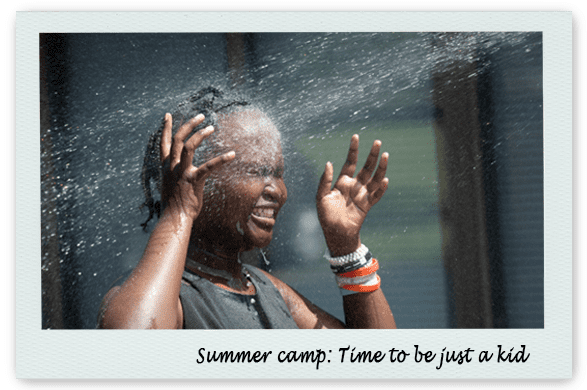
The Excitement Begins . . . Again.
After a two-year hiatus, Children & Youth Services in DuPage and Aurora were back at it. They offered in-person day camps to provide children with summer fun. Three camps for school-age youth were held last July, hosted by three World Relief partner churches. A total of 60 kids participated, assisted by 65 World Relief volunteers and staff.
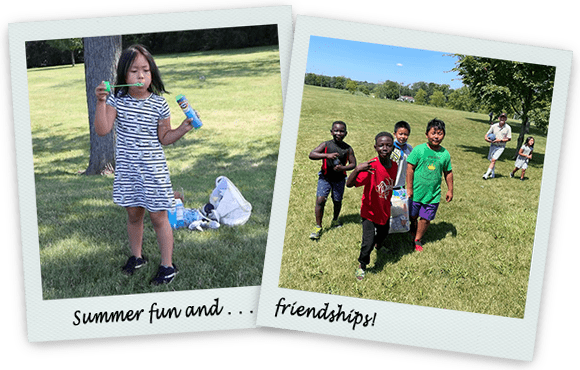
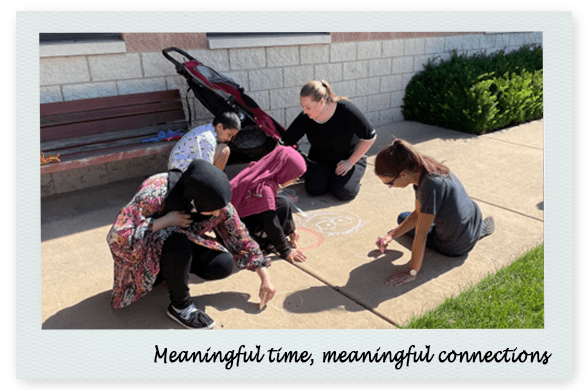
For many campers, it was the first time they got to participate in camp or any kind of summer program. The days filled up with hula hoops, jump ropes, bubbles, sidewalk chalk, soccer and sports in nearby parks. While some caught up with their classmates, others reconnected with ones they knew from World Relief’s After School Club and tutoring programs.
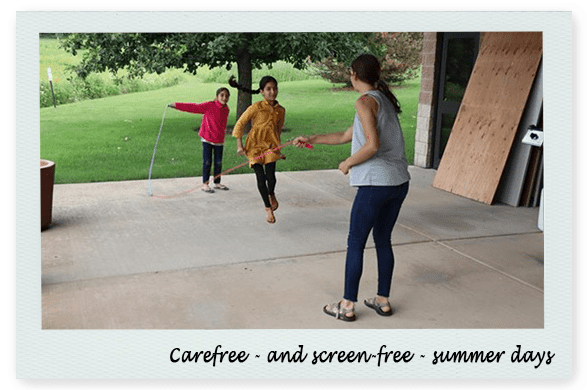
Brushing Up on English
Along with fun and fellowship, World Relief summer camps offered a chance for youth to practice their English. Since most participating families are recent arrivals to the U.S., English is their second language and not spoken at home. This can lead to it getting lost or rusty over a long break from school. The perfect remedy to prevent that? A few hours each day at camp where they can speak English together.
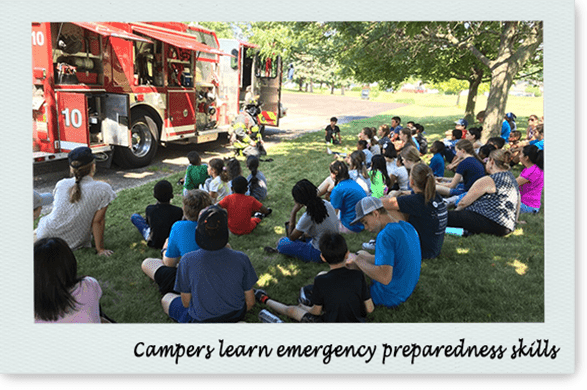
Learning Safety From the Pros
Other learning opportunities focused on safety and preparedness. In Aurora, eight Fire and Police Department first responders demonstrated real-world emergency preparedness skills. They stopped by in their specialized vehicles to interact with the kids and teach them about community safety. They gave tips for what to do at home if there’s an emergency and how to call 911.
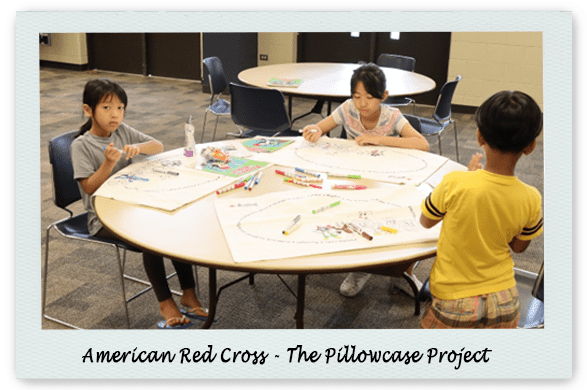
Spending Time With American Red Cross
At all three camps, American Red Cross volunteers taught tornado preparedness and home fire safety through storytelling and games. Campers practiced fire drills outside and learned how to keep their families safe inside if they hear tornado sirens.
The Red Cross’s Pillowcase Project was a creative way to prepare safety items at home in case of an emergency. Everyone colored their own Red Cross pillowcases, which also serve as an emergency kit.
Connecting With Counselors
World Relief volunteers and Children & Youth Services staff were on hand each day to supervise and engage with the campers. But more importantly, they showed how much they want these children to succeed as they resettle into a new way of life.
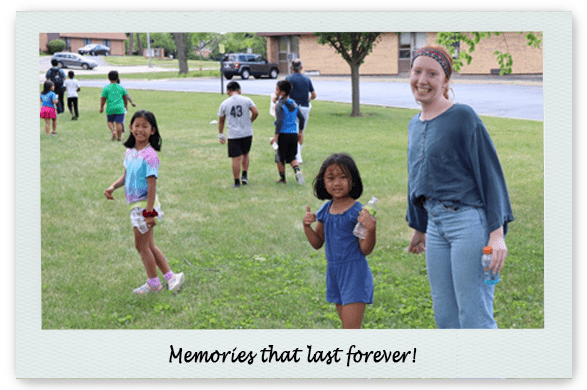
How do you measure summer camp fun? There may not be an adequate way to capture it, except by the smiles that were everywhere. Or in the words of one young camper, “This is the best camp ever!”
Make an Impact
World Relief Chicagoland has ongoing volunteer opportunities that you don’t have to wait for summer to start. Start making an impact today – and memories!
Liberty and Justice for All: A Citizenship Story
On September 17, U.S. Citizenship and Immigration Services invites “Americans to reflect on the rights and responsibilities of citizenship and what it means to be a U.S. citizen” as part of an annual Citizenship Day observance. This year, we’re celebrating citizenship and the stability it can bring to those who have been displaced by sharing Aimee’s story.
For the first 24 years of her life, Aimee had no citizenship at all. Born as a refugee in the Republic of Congo and resettled in the U.S. at the age of 15, living without citizenship felt like a continual search for permanence — until July 2, 2022 when she became a naturalized U.S. citizen. Finally, Aimee has a country to call her own!
On the World Relief Western Washington blog, Aimee shares what citizenship means to her and how she plans to use her new nationality to continue serving displaced people around the world.
Do you want to help more people like Aimee Pave the Path to a brighter, more secure future? Whether helping displaced people rebuild their lives, building peace in divided communities or finding sustainable solutions for families impacted by climate change, you can be a part of creating lasting change around the world when you join The Path, our community of monthly givers.
Volunteer Feature: Janine
“We are all called to live out our faith. Why help the next person? Because that is what God called us to do in the Bible.”- Janine
Janine attends Garland Church and first got involved with World Relief through a Good Neighbor Team – a small group that surrounds and supports a family in the resettlement journey for six to twelve months. Garland owns a transitional home and were housing an Afghan family with ten children. (The family actually has 12 children, but the two married daughters remained behind in Afghanistan.) Janine was working with the family on their English language skills when the pastor of the church came in with a large stack of medical papers that needed to be addressed.
“We finished the English class, and I got up and walked over and said, ‘Can I see those?’ And I go, ‘You know what? The way that I can walk along side this family is by utilizing my experience as a nurse.’”
“Ministry takes place when divine resources meet human needs through loving channels to the glory of God.”― Warren W. Wiersbe, On Being a Servant of God
Janine recognized that the family’s greatest need coincided with her experience as a nurse. She has been in the medical field since the 1970s and a registered nurse since 1989. The father of the family had a number of medical needs as a result of being hit by an IED in Afghanistan, and with 10 children, you can just imagine how the medical appointments added up.
Initially, it was a full-time job. “As a nurse, you cannot see that need and not help them. What I am doing is community health nursing, and if I could do it overseas, why can I not do it in America where there are people who desperately need the help?”
Janine’s husband is a construction engineer, and together they have lived all over the world. Coming to Spokane was her 25th move, and she is hoping, her last. She has worked as a nurse everywhere they have gone — Los Angeles, San Francisco, West Virginia, Maine, North Carolina, Bulgaria, Jamaica, South Carolina, Canada, and New York.
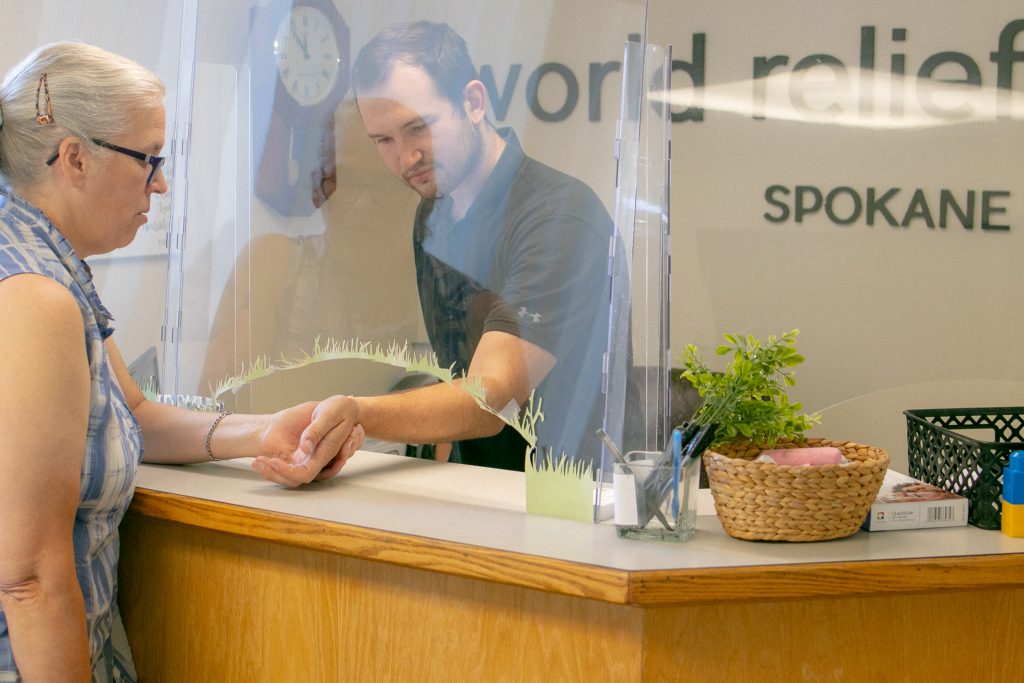
Above: Janine is checking Micah’s pulse.
“A nurse is a nurse around the world, that doesn’t change.” Janine recognizes that medical language and the processes surrounding medical care are complicated – even when you understand the language. Add in a language barrier, and it becomes overwhelming.
“I know what it is like for them, I have been in their shoes.”
She remembers living in Bulgaria. “The director at my kids’ school showed us all around, and he took time out of his day, and he said to me ‘Janine, you need to learn to step out on your own.’” Janine had to learn the language enough to ride the bus, get a taxi, go grocery shopping, etc.
“These people are here and they need the help… Some people will say, ‘Oh, well, they are just getting free handouts,’ but you know what? This family, I’ve watched them, and they want to make it on their own. They just need that little extra help to get started.”
Like Janine, you can help a recent refugee or asylee family or individual adjust to American life by walking alongside them with a group of volunteers (a small group of your friends and/or fellow church members). With World Relief’s support, you’ll be their guide from the very beginning, from meeting them at at the airport, to helping enroll them in social services, to building a relationship. Start the volunteer process here!
Sudanese Student Begins First Semester at Local University
Darelsalam Karama’s family arrived in the United States in 2018 when she was fourteen. In those four years, Darelsalam was placed in many different environments that brought about many challenges. “We started at Thomasville Middle School, and everything was so different from Sudan,” she says. “My native languages are Arabic and Zaghawa, so I went to the newcomer’s school. I was more comfortable there because there were a lot of refugees just like us.”
After just four years since she arrived in the United States, Darelsalam has received a full ride to High Point University.
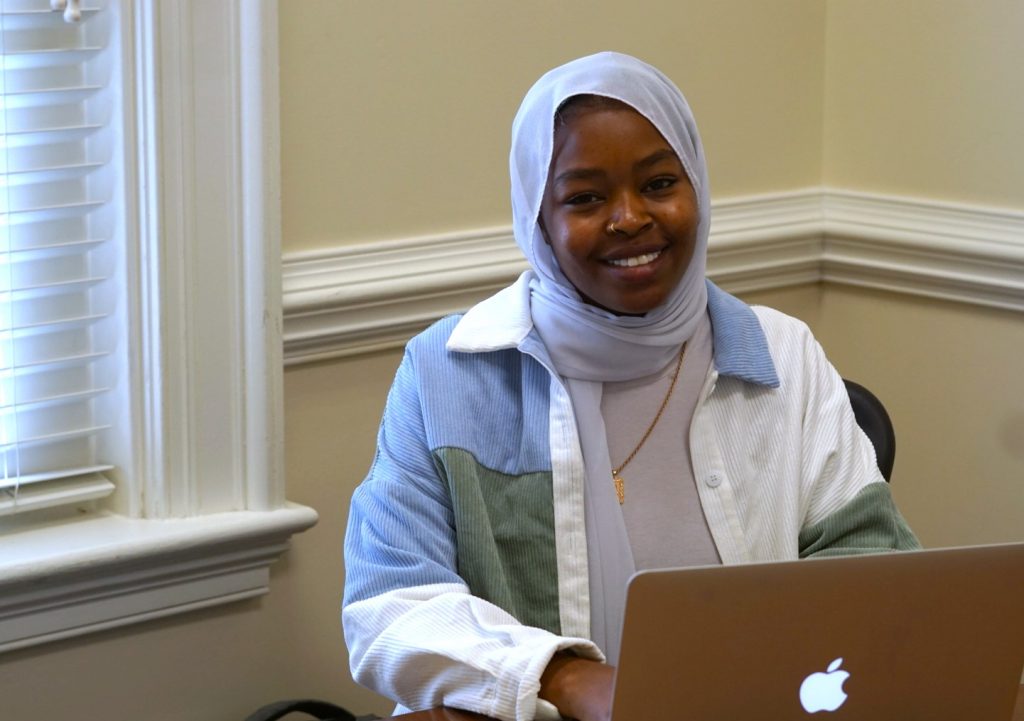
After six months at the newcomer’s school, Darelsalam’s English was at a level of proficiency that she was able to transfer back now to high school. “Even though English is not my first language, I made my parents proud because I made straight A’s the first semester,” she says.
She points to the motivation and support of her family and her ESL teacher as what carried her to apply for college. “Someone I’ll never forget is Judith, my ESL teacher at High Point Central High School,” Darelsalam says. “I’m very thankful for her. She is a really sweet woman with a great heart.”
Still, even after Darelsalam knew she wanted to apply for college, she wasn’t sure how to proceed. This is where the World Relief Triad team and their Youth Mentoring Program came to light.
“I knew I wanted to go to college by my junior year, but even that felt too late,” Darelsalam says. “It was hard to plan or think about college because I was still learning. But I talked to many people who encouraged me and helped me write my college essay, fill out applications, and apply for scholarships — Mostly, Kyle and Rowan were extremely helpful.”
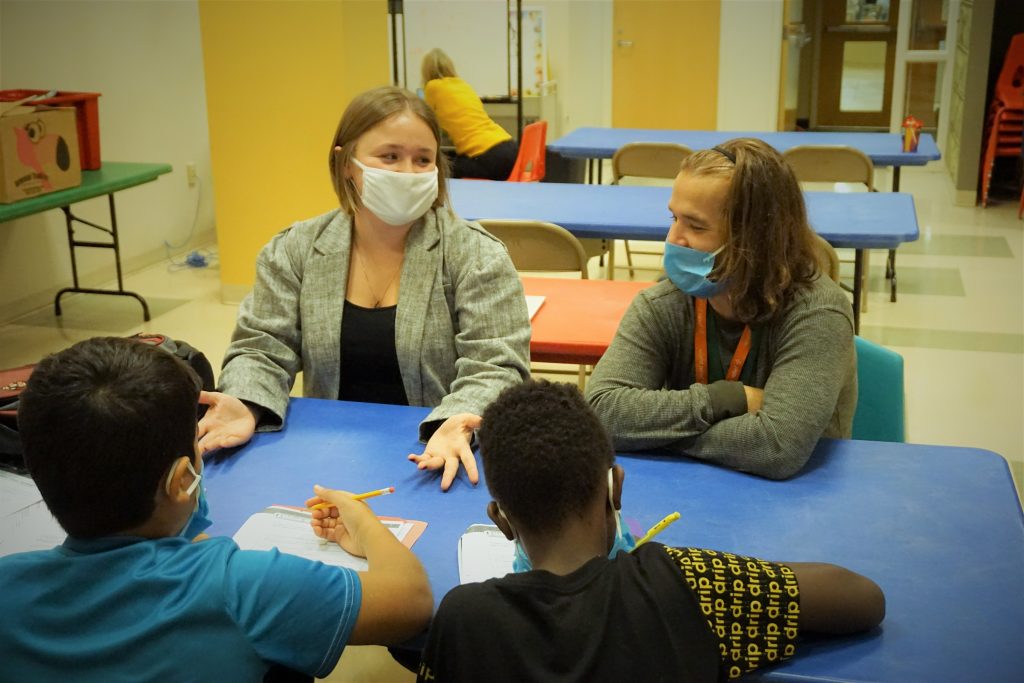
Kyle Bahm, Youth Mentoring Coordinator for World Relief Triad, says that Rowan Geukgeuzian, High Point University intern at the time, was able to assist Darelsalam where she needed it. “But Darelsalam doesn’t need much help,” Kyle says about Darelsalam. “She’s motivated. She can do things independently, so I just check in and ask if she needs help.”
Kyle speaks about the ease and comfort students like Darelsalam provide him in his work. “When someone is self-motivated, like Darelsalam, and they just need a little bit of guidance, it allows me to focus on others who may need a little more assistance,” he says. “It also encourages the younger siblings and sets an example. That helps me to challenge some of the other families’ oldest children to do the same for their peers and younger siblings.”
Darelsalam speaks of her siblings, and her entire family, as the source of her motivation. “My siblings help to motivate me, and my parents. They didn’t argue or try to change my mind. They are super supportive. I hope my siblings all can go to college as well.”
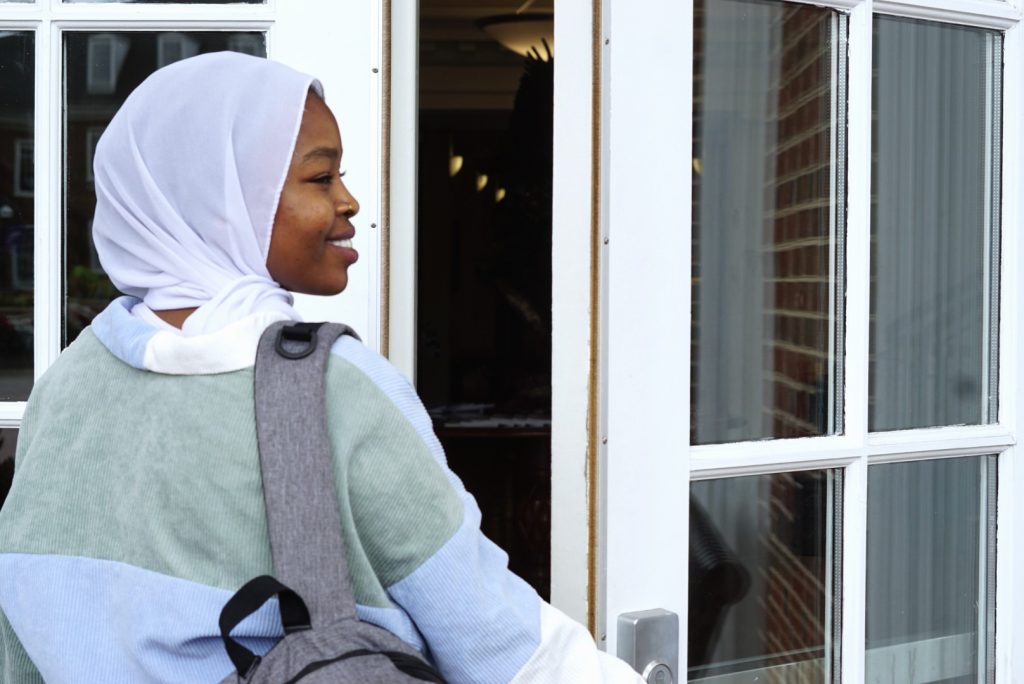
Darelsalam began her first semester at High Point University only a few weeks ago, now. Currently, she is enrolled as a biology major as she wants to become a family medicine doctor, and will be taking other foundational courses to improve her reading, writing, and time management skills. She is looking forward to working at the community clinic as a volunteer and Bonner Leader, a program at High Point University that “seeks to transform the lives of students as well as their campuses, local communities, and nation by providing access to education and opportunities to serve.”
“It’s really fun for the most part; though I’m learning how to balance my time with working and going to classes,” she says. “I volunteer eight to ten hours a week, but I can also put these hours on my resume, which is good.”
After sharing her journey from Sudan to North Carolina in her college application essay, Darelsalam continues to share her story as a way to possibly inspire those who came from similar situations such as herself. “I just wanted to show where I started, and what my struggles were,” she says. “I hope it encourages others who are in similar situations.”
You can help empower other individuals similar to Darelsalam today. Click the button below to learn more about how you can get involved with our Youth Mentoring Program at World Relief.











